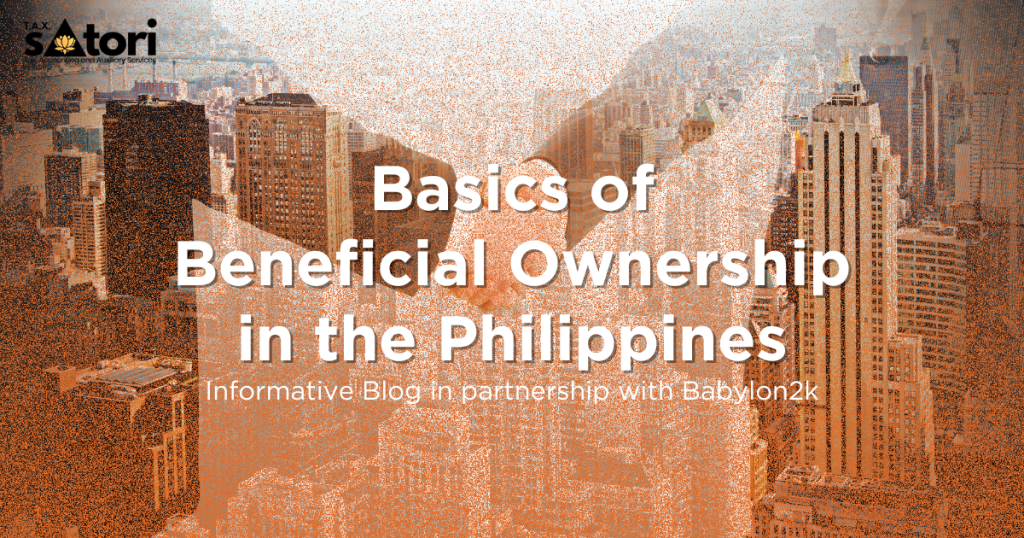The Basics of Beneficial Ownership in the Philippines

As a business owner in the Philippines, it is important to understand the concept of beneficial ownership. In simple terms, a beneficial owner is someone who has the right to enjoy the benefits of ownership of an asset, even though the legal title is held by someone else. In this guide, we will discuss the basics of beneficial ownership in the Philippines, including its definition, types, identifying beneficial owners, and tax implications .
What is Beneficial Ownership?
Beneficial ownership is a legal concept that refers to the right of an individual or entity to enjoy the benefits of ownership of an asset, even though the legal title is held by another person or entity. This means that the beneficial owner has the right to use, control, and profit from the asset.
In the context of business, beneficial ownership usually refers to the ownership of shares in a company. A shareholder who holds a significant percentage of shares in a company is considered a beneficial owner, even if the legal title is held by a nominee or a trustee.
Types of Beneficial Ownership
There are two types of beneficial ownership: direct and indirect. Direct beneficial ownership occurs when an individual or entity holds legal title to an asset.
Meanwhile, indirect beneficial ownership occurs when an individual or entity has the right to enjoy the benefits of ownership, even though legal title is held by another person or entity. Hence, it can occur when shares are held by a nominee or a trustee. In this case, the nominee or trustee holds legal title to the shares, but the beneficial owner has the right to receive dividends, vote on corporate matters, and enjoy other benefits of ownership.
Identifying Beneficial Owners
Identifying beneficial owners can be a challenge, especially in cases where shares are held by a nominee or a trustee. To address this challenge, the Securities and Exchange Commission (SEC) has issued guidelines on the identification of beneficial owners of publicly-listed companies.
Under these guidelines, companies are required to maintain a register of beneficial owners, which includes the name, address, and taxpayer identification number of each beneficial owner. Companies are also required to disclose the percentage of ownership held by each beneficial owner in their annual reports.
Beneficial Ownership and Taxation
Beneficial ownership can have significant tax implications, especially in cases where shares are held by a nominee or a trustee. In general, the beneficial owner of shares is responsible for paying taxes on any dividends or capital gains earned from those shares.
To ensure compliance with tax regulations, it is important for beneficial owners to keep accurate records of their shares and any income earned from those shares. Seeking advice from an expert is crucial to ensure full compliance with tax responsibilities.
Conclusion
In conclusion, beneficial ownership is an important concept for business owners to understand, especially in the context of shares and other assets. Regulatory requirements for identifying beneficial owners can be complex, but it is important for businesses to comply with these requirements to prevent money laundering and other illicit activities. By understanding the basics of beneficial ownership, business owners can protect their assets and ensure compliance with tax and regulatory requirements.
Call-to-Action
Discover how T.A.X. Satori can be your ultimate ally in navigating the complexities of beneficial ownership in the Philippines.
Our comprehensive tax planning solution empowers individuals and businesses to take control of their finances, maximize tax savings, and achieve financial success. With expert guidance from our seasoned tax professionals, you can gain a deeper understanding of beneficial ownership rules, ensuring compliance while optimizing tax benefits. T.A.X. Satori’s innovative financial management tools streamline the process of identifying beneficial owners and managing related tax obligations, simplifying record-keeping, reporting, and regulatory compliance. Our personalized consultations cater to your specific needs, whether you’re a local entrepreneur or an international corporation, ensuring you stay ahead in terms of compliance and tax planning. Stay updated with the ever-changing tax landscape with our continuous monitoring of Philippine tax regulations related to beneficial ownership.
Leverage T.A.X. Satori to maximize legitimate tax savings opportunities while maintaining full compliance with tax authorities. Let us be your local tax guru, guiding you through the world of beneficial ownership and empowering you to thrive in the realm of finance and taxation.
Additional Resources
For more information on beneficial ownership and related topics, please refer to the following resources:
Anti-Money Laundering Act of 2001 (AMLA)
Securities and Exchange Commission (SEC) Guidelines on Beneficial Ownership
Philippine Tax Code and Regulations
No Comments yet!